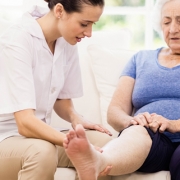Managing Pain
Chronic pain is one of the most common reasons adults seek medical care. In fact, statistics show that 60-75% of adults age 60+ report at least one type of chronic pain. Living with chronic pain can be overwhelming and greatly impact your quality of life. Pain can be debilitating making it very difficult to get around and complete daily activities. Also, many adults suffering from pain may experience depression, anxiety, trouble sleeping, weight loss and cognitive impairment.
Pain is not a normal part of aging. If you or someone you know suffers from chronic pain, talk with your doctor to discuss ways to manage your pain without prescription opioids. Pain relief can include many strategies including physical and occupational therapy, exercise, acupuncture, massage, spinal manipulation, interventional therapies (injections), cognitive behavioral therapy, and meditation among many others. These methods can often be more effective than drugs and have fewer risks and side effects.
How Can Therapy Help?
Physical therapists can assess your pain and establish a therapy treatment plan fit for you. Treatment goals may include: pain relief, extended range of motion, increased strength and improved functional mobility. Non-invasive technology such as electrical stimulation (e-stim), ultrasound therapy, and hot and cold therapy can help to reduce pain and inflammation.
Occupational therapists work to evaluate how pain may be impacting your desired activities and quality of life. They can teach skills and strategies to help manage your pain.
Pain Quiz
-
- Does pain affect your ability to handle daily responsibilities or activities?
- Does your pain make it difficult for you to bathe or get dressed?
- Does your pain make it difficult to climb or descend stairs?
- Does your pain make it difficult to get out of bed or a chair?
- Are you taking opioid medications daily?
If you answered yes, talk with your doctor about physical and occupational therapy treatment options.
IASP® – Facts on Pain in Older Persons, www.iasp-pain.org





